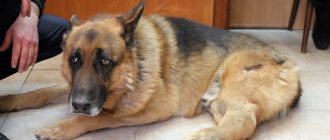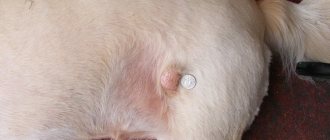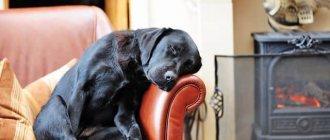Why do dogs often hide under the bed?
It is quite common for a dog to hide under the bed.
Let's look at the reasons why this happens and find solutions to eliminate these problems. According to experts and dog breeders, the reason may be the natural origin of dog breeds from wolves. Wolves dig their lair in the ground, since the dog is a direct descendant of the wolf, it retains the same genetic characteristics. The wolf’s den is protected by earthen walls on all sides, and a dog that has crawled under the bed is protected by a mattress on top, and on the sides by the walls of an apartment or house.
There is no need to fight nature, but take the genetic characteristics of dogs for granted and buy her a house made of padding polyester for dogs, which can easily replace a wolf’s den.
A change of scenery
Due to the owners moving to another house or apartment, the dog's behavior may change. Give the dog time to get used to the new place and the dog’s psychological state will return to normal.
The dog does not eat anything, moves sluggishly, drinks a lot of water. The dog's nose is dry and warm. These are clear signs that the dog is sick with an infectious disease.
Urgently call a veterinarian to your home so that he can examine the dog and prescribe the necessary medications for effective treatment of the disease.
Most owners have to deal with the aging of their pets. They are forced to contact a veterinarian with complaints about physical and mental disorders that arise due to age in their four-legged friends. A dog over 8 years old is usually called “old” or “senior”, but the rate of aging depends on a number of factors: breed, size, feeding, lifestyle. It is believed that giant breeds such as the Irish Wolfhound or Great Dane age much earlier than smaller breeds such as the Miniature Schnauzer. An analysis of the age composition of patients presented to veterinary clinics in our city showed that more than 30% are dogs over 7 years old. The aging of the population has led to a marked increase in the number of age-related behavioral problems.The emergence of behavioral problems is caused by age-related neurodegenerative changes, leading to deterioration of the functions of the cerebral cortex, including memory and learning ability. It is believed that in their symptoms and pathophysiological features, such disorders are similar to dementia such as Alzheimer's disease that occurs in humans.
Old dogs often wander aimlessly around the house, being disoriented and confused; dogs often bark at previously familiar objects, for example, furniture in the house or trees and bushes on the street, and become frightened of them. They do not immediately recognize people, including the owner, when returning from a walk, they do not recognize the road leading to the house, or they sit near the internal doors, asking to go outside - all these manifestations qualify as symptoms of disorientation. The most obvious signs of inappropriate animal behavior appear in the interactions of older dogs with people and other dogs. Owners are most upset by the deterioration of their relationship with their pet, whose greeting no longer brings the same joy. Sometimes dogs begin to respond slower and less consistently to commands, and owners mistake this for stubbornness. Defensive aggression on the part of an elderly animal towards dogs living in the same house is often observed. The young dog is usually seen as the aggressor in this situation, when in fact it is the older dog's behavior that is causing the tension and confrontation. The daily sleep-wake cycle changes. Dogs sleep a lot during the day. At night, old dogs show signs of restlessness, walking from corner to corner, barking or whining.
Such manifestations can also be caused by diseases of the internal organs or the musculoskeletal system, for example arthritis (in which the animal experiences pain and becomes irritable) or chronic renal failure. Therefore, the dog needs to be examined.
To make it easier to keep an old dog, it is advisable to make its environment more predictable. It is not recommended to rearrange the furniture in the apartment, as this aggravates the problem of disorientation. Introducing obvious visual markers, such as clearly marking entrance doors, helps the dog to find his way better. Daily (3-4 times a day) short walks with your pet stimulate his interest in his surroundings and improve his interaction with his owner. In case of unclean behavior, it is necessary to walk the dog after eating, sleeping and playing. Owners should maintain a strict schedule for their pets to ensure maximum predictability in their daily activities. It is necessary to optimize the diet to include antioxidants. Drug and behavioral therapy under the guidance of a veterinarian will allow owners to maintain a good quality of life and keep their friend close to them for as long as possible.
Zhanna Varaksina
Newspaper "Presentation", Kirov
2004
Birth of puppies
After the birth of puppies, the dog’s body looks like a “survived lemon.” All this is due to the fact that the dog’s body during pregnancy gave all the nutrients and vitamins to the future offspring in the womb. With such severe exhaustion of the body, the dog’s mental state also changes. The dog becomes too aggressive or, on the contrary, very timid.
Is your puppy hiding under the bed? This is due to the fact that your puppy is playing with you. His psyche has not yet formed, so very often we cannot understand his behavior, even if it seems not entirely normal to us.
Not much time will pass and your puppy will become older, and the habit of hiding under the bed as a game will disappear by itself.
Reasons why a dog whines
Knowing the reasons why a dog whines and squeals will help the owner understand the seriousness of the unusual behavior of an emotional pet:
- First of all, whining is typical for puppies. Babies who have just been taken from their mother experience fear, uncertainty, and stress. Finding itself in an unfamiliar environment, a young animal yearns for its brothers and sisters and its mother’s warm side. Puppies often whine when they are hungry, cold or hot. In this way, defenseless young animals call for help or signal their well-being.
- An adult dog whose puppies have been taken away can also experience a stressful situation. In this way, the pet notifies others about its emotional state. There are frequent cases of whining in females during estrus. In such situations, breeders recommend that owners redirect the dog’s attention, occupy it with new games, and walks in unknown places.
- Experienced dog breeders recommend paying attention to the reason for whining, such as the hunting instinct. Even breeds that are far from being used for hunting can indulge in natural desire. A dog may squeal and whine at the sight of “game” in the form of a cat, a hamster, game birds, or a squirrel in a tree.
- Gambling pets of hunting breeds are emotional not only in the forest or on the field, but also at home when they see that the owner is getting ready to hunt. Fighting breeds behave similarly before a fight, anticipating the upcoming fight.
- The reason that a dog whines and squeals is often the emotionality of his four-legged friend. The animal can thus inform the owner that his presence brings him joy. Overly sensitive pets whine and squeal even if the separation from their beloved owner was short-lived. This feature is typical for representatives of miniature breeds, characterized by nervousness and emotionality.
- A dog can whine, thus expressing its impatience or some kind of request. Most often, the use of puppy whining by an adult dog is observed when begging for a treat, tasty morsel or supplement. It is difficult to wean an animal from such behavior. To do this, the owner and all household members need to ignore whining and not encourage the pet to take such actions, fulfilling his request.
- The reason that a dog whines is often his desire to relieve himself. In such a situation, you cannot ignore the dog. During a walk, whining may be due to the fact that when communicating with its relatives, the pet expresses submission, obeying the norm of behavior in the pack. If the walk is interrupted by the owner at some point that is interesting from the dog’s point of view, then the dog can express its unfulfilled desire by whining.
- Both adult and young animals can suffer from loneliness if the owner leaves them alone for long periods of time. In this case, whining is regarded by experienced dog breeders as an expression of negative emotion due to the absence of a beloved owner. A variety of toys will help to wean your pet from whining in this situation, as well as a long walk upon the owner’s return and active games with the pet.
- Whining can be observed not only for physiological, behavioral or emotional reasons. In this way, the animal can signal the owner about its health problems. In addition to obvious pathologies, when a dog is wounded, injured, or limping, whining can be a symptom of hidden damage.
The owner should pay attention to the exact moment the animal whines. If squealing accompanies the act of urination, this may be a signal of urolithiasis or the presence of inflammation in the genitourinary area. Squealing when leaning on a limb is evidence of a splinter, dislocation or more serious injury. Dental diseases, chronic diseases, diseases of internal organs are often accompanied by pain.
The owner's attentive attitude to the pet's behavior will help to identify the disease in time.
Why did the dog start hiding?
Cats were usually seen in something similar - these animals, in moments of danger (real and imaginary), always huddle in some kind of shelter. It’s hard to blame dogs for cowardice! Nevertheless, such behavior patterns do occur: the dog fearfully hides in a secluded place (for example, under a sofa or bed) and watches the development of events from there. Why is this happening? Fear? Something else? Let's think and reason.
Maybe it's even nice? First let's assess the situation. Were there any moments that could have caused fear or fright? Nothing like this even came close, and the dog, not without pleasure, climbs under the sofa - it is possible that he is simply comfortable there. Let's turn to the nature of these animals - they love to set up “dens” for themselves, where they feel relatively safe. At home, the space under the sofa can also serve as a den! We need to think logically about what exactly led the pet to this behavior: the house is noisy, annoying children, someone is constantly squeezing its paws. And even other, no less “harmful” and “annoying” pets.
Fear. Also an important reason. Actually, in moments of danger, a dog has two options: accept the challenge (that is, get into a fight) or run away. What exactly will your dog choose? It’s hard to say, depending on what the “threat” is. Does it come from a naughty child? The dog will be able to stand up for itself and demonstrate a defensive response. Another thing is unknown external threats: thunder, fireworks, other sharp sounds. Most likely, the pet will prefer to hide. The space under the sofa is small and relatively dark - ideal conditions to feel safe and calm. Observe the animal's body language: you will see flattened ears, a tail between the legs, hear a warning growl - it is better not to approach.
Fears and phobias in dogs, as a rule, are formed at a young puppyhood. For example, you could train your puppy using a spray bottle and splashes of water. This is enough for a phobia to develop. Every time you pick up a bottle of water (just drink it), the animal will experience severe fear.
Why does a dog hide in a dark place: let’s look at it in detail
Why does a dog hide in a dark place, under a bed or sofa, climb into a closet or pantry, hide in a corner and turn away? Quite a few dog owners are faced with this issue after noticing strange behavior in their pet. Where does this secrecy come from and could it indicate serious problems? Let's take a closer look.
While living with a dog, you have probably noticed that after playing, walking, active communication or eating, the pet goes to the same place. This behavior is explained by the desire for peace - this is a natural reflex and there is nothing strange about it. However, if your ward has become too secretive and hides most of the day, you should be wary. Below we will look at the probable causes of strange behavior and recommendations for eliminating them.
Behavior problems and increased emotionality
Experienced dog owners know that after walking, playing, communicating with family or guests, or having a meal, their four-legged pet always goes to the same place. Despite their sociability, curiosity and affection, these animals still need peace, and this reaction is not unusual or strange.
However, if the dog becomes too secretive, quiet and out of sight for most of the daytime, the owner should be wary. Perhaps the dog needs help. There are certain phenomena that more often than others force animals to hide away, for example, fear.
Fear is a normal condition that allows animals to survive in the wild. Fearless dogs die before others, doing too risky things. It is fear that drives the dog into a dark corner. In addition, the following signs of fear can be observed in your pet:
- trembling, during a panic attack - convulsions;
- in daylight, the pupils narrow;
- rapid breathing, heart rate;
- the dog whines pitifully;
- display of aggression is possible, including towards the owner;
- the tail is hidden between the paws, the ears are pressed to the head.
It seems that what can a pet be afraid of if it is at home, in a familiar environment? However, even here situations may arise that make four-legged animals afraid.
People the dog doesn't know
It is not known by what signs, but dogs can distinguish good people from ill-wishers. And if a representative of a guard breed attacks an intruder or takes a warning pose and uses his voice to “point” such guests to the door, a tiny pocket dog or simply a cowardly pet will hasten to hide. Dogs that have not undergone socialization can behave the same way.
Fear of people is considered a behavioral vice; a well-bred dog should not be afraid of them. Although some representatives, having made sure that there is no danger, may avoid unnecessary contacts.
Extraneous noise
Some dogs are frightened by loud music, which is not surprising, since the hearing of these animals is much more sensitive than human hearing. Excessively intense sounds can cause not just discomfort in animals, but even pain. Dogs are especially anxious about music with loud bass and high frequency.
Many pets are frightened by thunder and lightning, and during a storm they experience extreme stress. But they are disturbed not only by the sounds coming, but also by the electrified air, which gives the dog’s fur a static quality - even weak electric shocks are quite noticeable for dogs.
Pets may become restless and look for a darker corner during general fun, accompanied by fireworks and fireworks. Experts have found that during the explosion of rocket launchers, dogs pick up ultrasounds that irritate them, and the subsequent roar scares even the bravest. Owners of hunting dogs that are not afraid of shots note that their dogs experience fear of such phenomena.
Negative experiences in the past
Animals often end up in a new home as adults, with established habits and behavioral characteristics. In this case, it is almost impossible for the owner to find out why the dog is hiding in the dark for no apparent reason.
Of course, it wouldn’t hurt to observe the animal; perhaps it will be possible to identify what provokes such a reaction. Maybe the dog is afraid of something specific, and the owner, having found out, can take appropriate measures.
Not all dogs are lucky with their owners, and they often end up in the wrong hands. Physical punishment, lack of education and socialization, rude or dismissive attitude, constant loneliness - all this leaves its mark on the character of the animal and its behavior. And one of the manifestations is fear, pathological, not characteristic of dogs.
In some cases, adult pets cannot be freed from fear, and they experience it throughout their lives. However, competent correction and a kind attitude reduce the symptoms of panic. In most cases, the help of an experienced dog handler is required, who will help to understand the mental characteristics of the dog and tell the owner how to establish the right relationship.
Dogs are also very intelligent and incredibly grateful. Having felt love and care from the new family, they try to get rid of phobias on their own.
First days in a new house
Both puppies and adult dogs can experience discomfort, fear and inconvenience when they find themselves in an unusual environment. Of course, everything depends on the character of the animal, its mental stability and the conditions of its previous place of residence. In addition, the owner himself can provoke such behavior by scolding a new family member or using physical punishment.
Sometimes a couple of days are enough for puppies to get comfortable, come to their senses and start exploring their home. Do not impose too much on your pet, encouraging him to communicate. Among the dangerous reasons that a dog begins to hide, experts note OCD - obsessive-compulsive syndrome and obsessive disorder.
If your dog is anxious, he may become depressed or have a nervous breakdown. Short-term stress is not dangerous, but if the pet is constantly in a stressful situation, it will suffer serious mental trauma.











